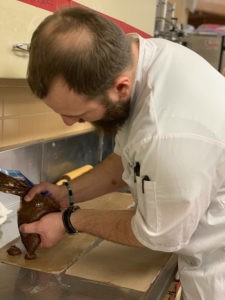What does it take to put on a one-of-a-kind event for a less-than-well-known holiday? Or asking top local chefs to step outside of their comfort zones to cook in a style that they aren’t used to? That’s what happens each winter at Beth El Synagogue for the annual Tu B’Shevat Seder.
This year’s event was the sixth annual – the seventh is already scheduled for Feb. 10, 2020 – and Rabbi Avi Olitzky has turned it into a yearly must-attend event that manages to stay interesting each year.
“Part of it has to do with the energy and the creativity of the chefs we recruit year after year,” Olitzky said.
This year’s quartet was Chef Katie Elsing from The Lynhall, Chef Tyler Hanlon of PUBLIC kitchen+bar, Chef Brandon Randolph, most recently at Pearl and The Thief, and Chef Karyn Tomlinson at Corner Table. Each chef had two courses they were responsible for preparing. The courses fit the themes of the seven species mentioned in the Torah: wheat, barley, grapes, figs, pomegranates, olives, dates, and honey.
“It’s something different,” said Randolph, who was on the winning team on an episode on Food Network’s Iron Chef. “We’re working with parameters and guidelines that we don’t typically do.”
Randolph prepared the second and fourth courses, a toasted barley smoked onion soup, and fig and black garlic ravioli.
Each chef has help with them in the kitchen throughout their prep time in the kitchen for the week leading up to the seder. The day of has all four chefs plus a variety of other helpers getting the job done.
One of those chefs is Eli Wollenzien, the executive chef/owner at Coalition. Wollenzien was one of the featured chefs in the past, but keeps showing up to help each year.
“I realized that if you could come back without the responsibility of a couple of courses it’s maybe way more fun,” he said.

Chef Brandon Randolph filling his Fig and Black Garlic Raviolo.
Wollenzien said the passion of Olitzky is part of what draws him back.
“I just enjoy it,” he said. “I don’t get in the kitchen a whole lot or to do large groups like this. I enjoy that part too. There’s always these young chefs that come do it.”
Chef Jeanne Gfrerer helped get both Randolph and Hanlon on board this year – both are customers of hers at Bix Foods, which is one of the produce suppliers for the event. Companies like Bix help Beth El not lose money.
“We don’t do this as a fundraiser. If we did it would be a different event,” said Olitzky, who added the event barely breaks even. “We only charge $125. We get so many in-kind donations, whether it’s produce or groceries or wholesale meat cost or wine cost.”
Keeping the event fresh each year is always a challenge for Olitzky. One of the ways he did it this year was introducing a Shehecheyanu Intermezzo between the protein courses. An intermezzo is used as a way to cleanse the palate, and the Shehecheyanu is recited when doing something for the first time. With Tu B’Shevat being the new year for the trees, there is a custom to eat exotic fruits. Elsing took the challenge to create a white fig and bergamot mousse, with an apricot arak pudding and a candied Buddha hand and kiwano melon.
“Everything we do for this dinner is really intentional,” Olitzky said.
Also rather than just having eight different Kosher wines, this year Olitzky worked with Tabor Winery in Israel, and Justin Kohn, their export manager, was on hand to talk about the wines brought in for the event.
As a way to tie multiple holidays together, the wines will be at the Beth El Purim wine tasting, and sold at the Passover wine sale.
Tomlinson, while preparing the confit duck leg for the pomegranate course, said that the constraints – having to cook a Kosher meal – was a good thing.
“Sometimes constraints can bring about creativity,” said Tomlinson, who won the prestigious Cochon 555 at the 10th Anniversary Grand Cochon. “I just am not able to use all my go-to moves. It’s good for me and challenges how I think about cooking.”
Taking part wasn’t an automatic “yes” for Tomlinson, but she was certainly glad she did.
“I have to be selective because we have a small kitchen staff,” she said. “I have a deep respect for Jewish history and tradition and I was really intrigued by that. And it’s a cool opportunity to cook for a part of the population that I don’t get to often.
Olitzky said that Beth El is the only synagogue in the world doing something quite like this, but it helps to be doing it within a smaller community like the Twin Cities.
“If this were New York or Los Angeles, we’d partner with a restaurant and it wouldn’t be as compelling,” he said. “We have chefs from past years who have enjoyed doing so much who come back even though they aren’t on the marquee and still help out in the kitchen, completely giving of their time. They think it’s such a nice change and such a challenge and nice opportunity.”
So what was it like to eat the meal then? Two TC Jewfolk staffers got to join the guests in attendance and decided it is more than just a meal, it’s a true experience. Between the food, wine, and company, it is truly an out of this world experience that should be at the top of any list for TC Jewish foodies.

